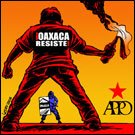Dear friends,
My friends Alba and Eulices asked me to be the godfather for their son Kuss Bryan, who was baptized on December 8 (photo below). It was a joy and an honor to become part of their family that day.
Alba is an amazingly strong and resilient person. Her left shoulder was shattered in the bombing of Santo Domingo in December 1998 when she was 16 years old, her father was killed by FARC guerrillas in March 2006, and her spouse Eulices was imprisoned during the mass arrest in Fortul in August 2006.
Residents of
Shrapnel from the bombs tore into Alba’s shoulder and into the right leg of her sister, Xiomara. As we sat in their kitchen after the baptism, they began talking about that day. “We’re lucky to be alive” said Alba. Xiomara then showed me the large scar on her upper leg.
Wilson Garcia, their father, was the community president. “There wasn’t a phone in Santo Domingo,” said Alba, “so he went to Betoyes (when the planes began flying overhead) to call the Red Cross. He saw us as he was coming back and we were leaving on the truck with the wounded. He didn’t know which one of us he should attend to first.”
The cluster bombs were manufactured in the U.S. and the coordinates for the bombing were given by U.S. crew members operating a surveillance plane for AirScan. Occidental Petroleum (based in Los Angeles) contracted AirScan (based in Florida) to provide security for the pipeline that transports oil from Occidental’s Cano Limon oilfield in the state of Arauca to the Caribbean coast. I found myself thinking about those connections as I looked at the scar on Xiomara’s leg.
I met
Alba gave birth to her first child, Kuss, on December 1, 2005. Eight months later, Eulices was arrested along with 15 other people in Fortul. I met Eulices in
Eulices was charged with rebellion and terrorism, and the prosecutor’s office alleged that he was an ELN militia member and recruiting for the FARC – not a very plausible accusation given the fight between those two guerrilla groups in Arauca. He was in prison on Kuss’ first birthday and he was finally released on June 9, 2007.
After Kuss was baptized, Eulices turned to me and called me “Compadre” (the godfather of my child). During the reception in their home, Alba also started calling me Compadre. I expressed my appreciation to them for inviting me to be Kuss’ godfather and Alba responded, “We couldn’t think of a better person.”
In love and solidarity,
Scott











